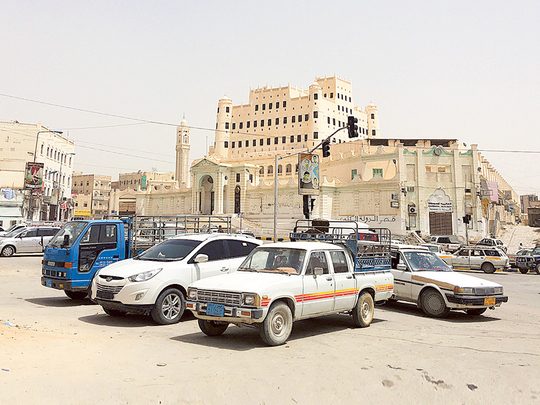
Seiyoun: In a small city tucked deep inside Yemen’s Hadramout province, business is booming as Yemenis from all over the country come here to escape the war.
Seiyoun is the second largest city in the province of Hadramout after Al Mukalla, which has been recently liberated from Al Qaida control by the Saudi-led Arab coalition who is fighting a two-pronged war against the terrorists and Iran-backed Al Houthi militants.
A receptionist at a local hotel tells Gulf News that occupancy has never been as high as now.
“Occupancy has never been this high since 2011 (Yemen’s Arab Spring uprising) when many foreign tourists stopped coming to Seiyoun,” he said, while requesting not to be named.
The recent escalation of violence peaked early last year when Saudi Arabia led a coalition of allied Arab countries to militarily blunt Al Houthis rapid expansionism.
Nearly all major cities have been directly affected either by Al Houthis fierce clashes with government forces or heavy bombardment by the coalition’s warplanes.
Other cities were overrun by the local branch of the Al Qaida militant group.
For hotel owners in Seiyoun, however, the bloody conflict is a blessing in disguise.
The receptionist said many injured fighters from the northern Jawf and Marib provinces have come to seek treatment at hospitals in Seiyoun.
Relatives of the injured fighters told Gulf News the Arab coalition is paying for the treatment of those injured in the war.
Also, Seiyoun’s airport is one of the few airports in the country not damaged by the war and there are regular flights to Jordan and Sudan.
“When flights are cancelled from Aden, passengers are bussed here,” the receptionist said.
Many people who are travelling onto Oman, stop over in Seiyoun, he added.
Allegiance to Hadi
When the war broke out last year, the Seiyoun-based 1st Military Region, commanded by Major General Abdul Rahman Al Halili, declared support to president Abd Rabbo Mansour Hadi.
Unlike the other six army regions that directly involved in the war, the 1st region is tasked to deal with some pockets of Al Qaida militants who seek to take territories in this part of Hadramout.
Hesham Al Saeedi, the deputy mayor of Wadi Hadramout, attributed peace in Seiyoun to army troops unity and location.
“The city is largely safe due to the 1st Military Region coherence. If you look at Seiyoun, you see that both army and general security forces are deployed unlike many other cities in Yemen,” he said.
But the cost of maintaining peace is high.
Dozens of army troops have been killed in clashes or attacks by Al Qaida militants in regions around Seiyoun.
The militants have carried out many deadly attacks on checkpoints and killed dozens of military and security officers and soldiers.
Despite the continuous attacks, the militants have failed to control even the smallest of towns in Wadi Hadramout.
Despite peace, tranquillity and the surge in visitors, some people here think the city’s vital basic services are crumbling.
During the city’s scorching summer, power cuts lasted up to seven hours a day.
Fuel and cooking gas were also scarce.
People sometimes queue outside of petrol stations for an entire day to fill their cars.
A taxi driver who wanted to be identified by his last name, Basaad, told Gulf News that power cuts have “disrupted” the peace.
Al Saeedi said long powers cuts and interrupted oil supplies are linked to trouble in other parts of Yemen.
“The main power station is run with gas emanating from oilfields.”
Oil companies have stopped pumping crude oil to the Dabah oil terminal in Al Mukalla, that came under Al Qaida control in 2015, since they are full. The government has to first sell the 3m barrels of oil in the installations before companies resume production.
The oilfields have also stopped producing diesel used to generate other power grids.












